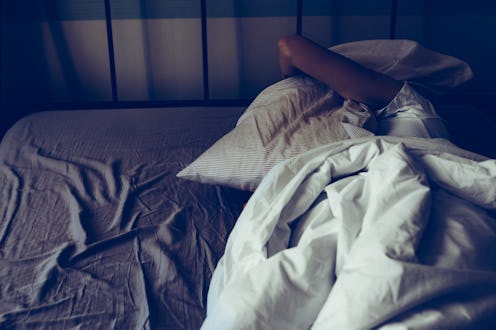
If you’re grinding your teeth at night, you’re definitely not alone — especially lately. It’s an issue that dentists and specialists are seeing more and more frequently, and tons of people are looking for expert tricks to stop grinding your teeth at night. Teeth-grinding (also known as Bruxism, or Sleep Bruxism) is a condition in which you clench and grate your teeth together while you sleep, and for most people, it’s pretty mild and doesn’t cause much damage.
For others, however, it can lead to some serious issues, like flattened teeth, chipped enamel, tooth sensitivity, face or jaw pain, irritations on your tongue or gums, and overbearingly painful headaches. That’s why I reached out to dentist and RealSelf contributor Dr. Victoria Veytsman. “There are so many possible causes for bruxism,” Dr. Veytsman says. “Stress, a bite that is not stable or aligned properly, joint instabilities, injury, sleep apnea, acid reflux, medications, and a complication of certain diseases or medications [are all possible causes].” If you’ve got a really serious case of Bruxism, definitely talk to your dentist. However, for less extreme cases, Dr. Veytsman was more than willing to share some of her expert-approved at-home options that might be able to help.
1. Wear A Dental Guard While You Sleep
Dental Duty Professional Dental Guard , $15 Amazon
According to Dr. Veytsman, “mouth guards are definitely effective” when it comes to reducing grinding during the night. This best-selling Dental Duty professional dental guard is designed for comfort, as it can be trimmed to fit any mouth and comes in two sizes. It’s also made with a BPA-free material that molds to your teeth to prevent grinding and damage.
2. If You’re Uncomfortable, Try A Front-Teeth Guard
SmartGuard Elite Night Guard, $26, Amazon
For anyone who finds full-mouth guards obtrusive and painful, Dr. Veytsman suggests going for one that covers only the front teeth, like this SmartGuard Elite night guard. “[They’re] smaller and more comfortable, and [they separate] the back teeth so they are not touching.” This one comes with two guards and a cleaning case, and reviewers love that it fits well, stays secured, and lasts a really long time.
3. Try To Abstain From Caffeine And Alcohol Before Bed
Your diet can seriously affect your hormones and stress levels. “Things like caffeine and alcohol will exacerbate grinding,” Dr. Veytsman says. “Any kind of stimulant or anything that affects the central nervous system can make grinding worse.” Cutting these things out— especially right before bed — can significantly reduce teeth-grinding symptoms, or even get rid of them altogether. Staying hydrated and avoiding stimulating foods like sugar can also be pretty helpful, too.
4. Cut Down Your Stress Levels Right Away
A Meditation for Relaxation & Wellness, $16, Amazon
According to Dr. Veytsman, meditation can “calm the nervous system, and it has been shown that high stress levels can contribute to grinding.” As a result, a nighttime meditation practice could do wonders. A Meditation for Relaxation & Wellness is an audio recording that promotes feelings of peace, calm, and safety using guided imagery and beautiful music, and reviewers are saying things like, “This is the best meditation tape I've ever used.”
5. Overcome Your Sleep Apnea Symptoms
When it comes to sleep apnea and bruxism, Dr. Veytsman says, “There's definitely a correlation there! Studies have shown that patients who have airway issues at night tend to grind. The grinding, it seems, reopens the airway. Once patients’ sleep apnea is controlled, the bruxism stops, so it's really like a protective mechanism.” During sleep apnea, you take pauses while you breathe, or super shallow breaths. Some people with sleep apnea have found relief using a mask over their nose that delivers what's called continuous positive airway pressure (CPAP). If you always wake up tired or with a dry throat, sleep apnea could be to blame.
6. Start Getting More Aerobic Exercise
Stamina 36-Inch Folding Trampoline , $27, Amazon
“Not only are lifestyle choices like exercise good for your overall health, but they are a great way to help decrease grinding,” Dr. Veytsman says, as they help to regulate the nervous system and reduce stress. Rebounding is my go-to aerobic exercise because it allows for tons of movement without excess stress on the joints, and this Stamina 36-inch folding trampoline is an awesome place to start. It’s got a strong and durable frame that’s great for jumping or jogging in place, and it folds up afterwards for easy storage.
7. Make Your Bedroom As Stress-Free As Possible
Esonstyle Wooden Diffuser & Sound Machine, $56, Amazon
When it comes to turning your bedroom into a stress-free, grind-free environment, Dr. Veytsman says, “Anything that has a general calming effect can be helpful.” This Esonstyle wooden diffuser and sound machine not only gives you a continuous flow of calming moist air, but it can be use alongside your favorite essential oils. It also got a relaxing LED light and five built-in nature sounds (birds, stream, waterfall, wind, or fire),and can be used as a speaker for the music on your devices.
8. Pay Attention To The Jaw
Those with Temporomandibular Joint Disorder (more commonly known as TMJ) often experience teeth grinding at night, and conversely, grinding your teeth can also lead to TMJ. It’s a vicious cycle, and as a result, it’s important to take good care of your jaw and your muscles. “Avoid chewing on things that hard and stick to a soft food diet,” Dr. Veytsman says. “Try to consciously relax your face during the day if you notice it tensing up. Massages can be helpful, too.”
Images: Basak Gurbuz Derman/Moment/Getty Images; Amazon (5); Giphy (3)